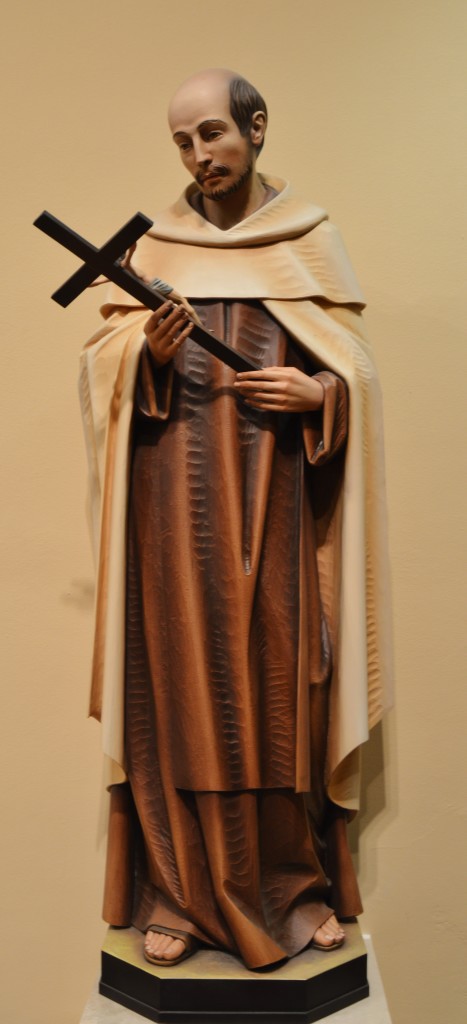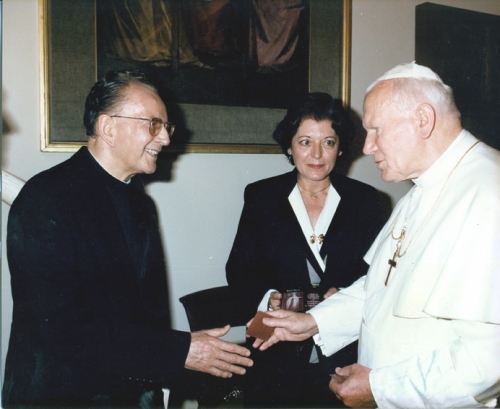St John of the Cross

Deeper spiritual direction: the left hand does not know what the right is doing
And thus the soul must be attached to nothing—nay, not even to any kind of meditation or sweetness, whether of sense or spirit. For the spirit needs to be so free and so completely annihilated that any thought or meditation which the soul in this state my desire, or any pleasure to which it may conceive an attachment, would impede and disturb–that it would introduce noise into the deep silence which it should observe, according both to sense and to spirit, so that it may hear the deep and delicate voice of God which speaks to the heart in this secret place, as He said through Osee, in the upmost peace and tranquility, so that the soul may listen and hear, as David heard, the words of God, when He speaks this peace in the soul. When this comes to pass, and the soul is conscious of being led into silence, and harkens, it must forget even a loving advertence of which I have spoken, so that it may remain free for that which is then desired of it; for it must practice that advertence only when it is not conscious of being brought into solitude or rest or forgetfulness or attentiveness of the spirit, which is always accompanied by a certain interior absorption
Wherefore at no time or season, when once the soul has begun to enter into this pure and restful state of contemplation, must it seek to gather to itself meditations, neither must it desire to find help in spiritual sweetness or delight, but it must stand in complete detachment above all this and its spirit must be freed from it, as the prophet Habakkuk…’I will stand upon my watch over my senses—that is, leaving them below—and I will fix my step upon the munition of my faculties—that is, not allowing them to advance in thought—and I will watch to see that which will be said to me—that is, I will receive that which is communicated to me’. For we have already said that contemplation is receiving, and it is not possible that this loftiest wisdom and lineage of contemplation can be received save in a spirit that is silent and detached from sweetness and knowledge. –St John of the Cross ‘Living Flame of Love’

St John of the Cross. Euclid, Ohio.

A Sunday kiss
Simple in in non-saying, a day filled with family, a significant other, swimming with little ones, a sister’s home, a mother’s birthday–sharing in Mass, a new born grand-niece, experiential usurping theoretical, planning for the coming Hocking Hills weekend at Sugarloaf Theater in Chilicothe, Ohio: Tecumseh the play, Shakespeare’s Macbeth on a Sunday, an abiding bed and breakfast, life assumes refinement, sacredness blessing with peace and contentment, furthering efforts availing to grace, revealing a hidden God within all the apparent. God is good and all giving.


NOTHING
Nada.
Nothing.
No declarations.
No pronouncements.
No promises.
No affirmations.
No negations.
No cleverness.
No pursuits.
No efforts.
No justifications.
No guilt.
No pride.
No shame.
No blame.
No avowal .
No allegations.
No premeditation.
No rationalization.
No analyzation.
No dissecting.
No debating.
No delusions.
No distractions.
No deflections.
No diversions.
No decisions.
No conclusions.
Cease and desist.
Wipe the slate clean.
Reset and restore.
A foundation fallen upon.
It is so very difficult.
Nearly impossible.
Only possible through the grace of God.
The word “nada” or “nothing” in English is used to summarize the whole doctrine of St. John of the Cross. And yet, this is a premature assumption because “nada” in St John, is only a means to an end, not the end in itself. This is important to know because St. John was not a “quietist” (a heretical movement in the Church during his time). The reputation he has of being a “hard to follow” guide comes from his insistence on this doctrine of the “nada.” –Quoted from a blog by a Carmelite sister: Mount Carmel.

They (spiritual aspirants) then grow weary and strive, as was their custom, to concentrate their faculties with some satisfaction on a subject of meditation, and they think that if they do not do this and do not feel that they are at work, they are doing nothing. This effort of theirs is accompanied by an interior reluctance and repugnance on the part of the soul, for it would be pleased to dwell in that quietude and idleness without working with the faculties.
They consequently impair God’s work and do not profit by their own. In searching for spirit, they lose the spirit that was the source of their tranquility and peace. They are like someone who turns from what has already been done in order to do it again, or like one who leaves a city only to re-enter it, or they are like a hunter who abandons the prey in order to go hunting again. It is useless, then, for the soul to TRY to meditate because it will no longer profit by this exercise. –St John of the Cross, ‘Dark Night of the Soul’
Though the path is plain and smooth for people of good will, those who walk it will not travel far, and will do so only with difficulty if they do not have good feet, courage, and tenacity of spirit. — St John of the Cross, ‘Sayings of Light and Love’

A whisper from St John of the Cross’ ‘Spiritual Canticle’
… .
Why, after wounding
This heart, have You not healed it?
And why, after stealing it,
Have You thus abandoned it,
And not carried away the stolen prey?
Quench my troubles,
For no one else can soothe them;
And let my eyes behold You,
For You are their light,
And I will keep them for You alone.
Reveal Your presence,
And let the vision and Your beauty kill me,
Behold the malady
Of love is incurable
Except in Your presence and before Your face.
… .


Love’s Living Flame
Dedicated to Rita
O Love’s living flame,
Tenderly you wound
My soul’s deepest center!
Since you no longer evade me,
Will you, please, at last conclude:
Rend the veil of this sweet encounter!
O cautery so tender!
O pampered wound!
O soft hand! O touch so delicately strange,
Tasting of eternal life
And canceling all debts!
Killing, death into life you change!
O lamps of fiery lure,
In whose shining transparence
The deep cavern of the senses,
Blind and obscure,
Warmth and light, with strange flares,
Gives with the lover’s caresses!
How tame and loving
Your memory rises in my breast,
Where secretly only you live,
And in your fragrant breathing,
Full of goodness and grace,
How delicately in love you make me feel!
– St John of the Cross

St John of the Cross. Euclid, Ohio.

Stand in the place where you are
How do you endure
O life, not living where you live,
and being brought near death
by the arrows you receive
from that which you conceive of your beloved.
St John of the Cross ‘The Spiritual Canticle’
In the midst of this purgation, God grants the soul brief illumination that draw her to seek the “Who” she loves behind every stammering. Must she die and be liberated from this earthly body to be with her Beloved? Or must she simply wait upon his bidding? Eager as she is for total immolation, the soul also knows that now is not the time to be freed from the body (Wretched man that I am! Who will deliver me from this body of death?–Romans 7:24). She sighs out of love, not discouragement. Every touch slays her anew. How blessed she is, despite her frail form, not to break under the weight of this cross. –Susan Muto ‘Deep into the Thicket’



Recent Comments